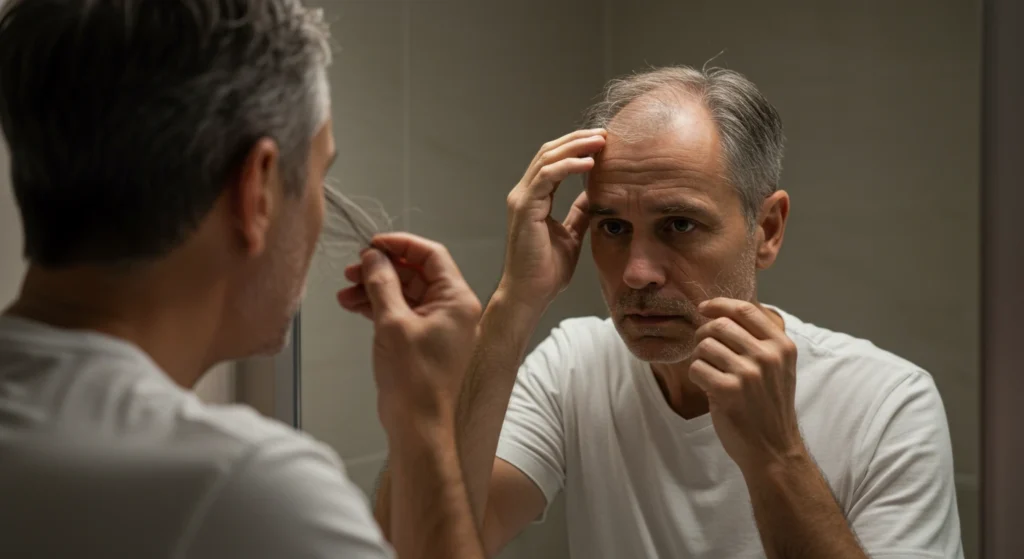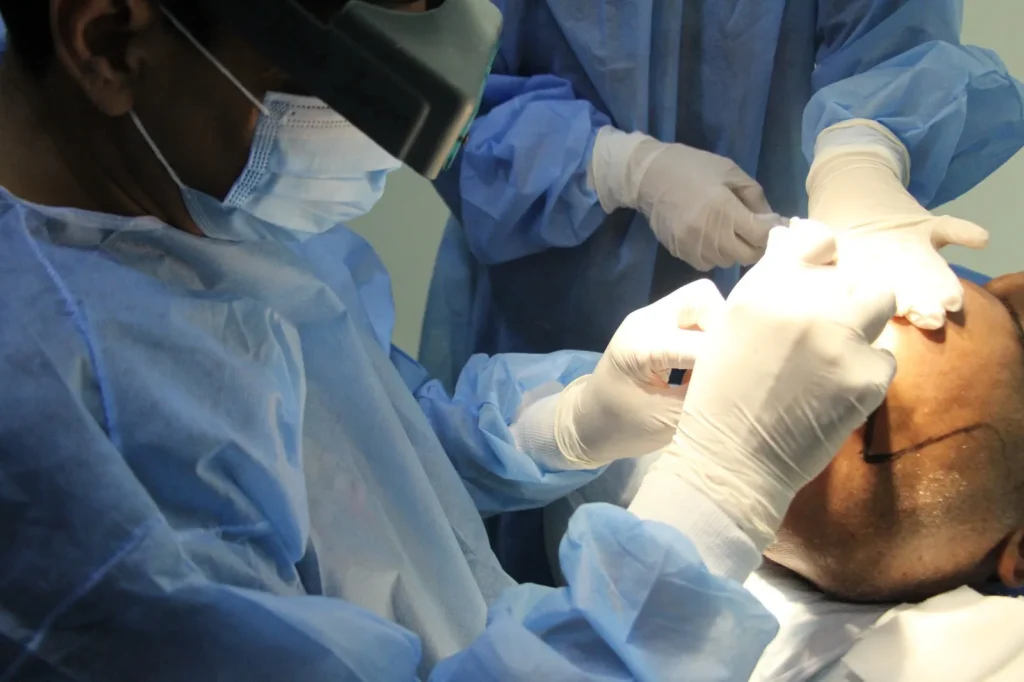Hair loss can be a difficult and frustrating experience, but finding the right hair loss doctor in Houston can offer hope and a path forward. A qualified hair loss doctor can guide you through personalized treatment options, from medical therapies to advanced hair restoration procedures.
By choosing the right specialist, you can regain your confidence and make informed decisions on your hair restoration journey. In this article, we’ll walk you through the key aspects of hair loss treatment and help you find a trusted professional in Houston who can help.
Understanding Hair Loss: Causes and Types
Common Causes of Hair Loss

Hair loss can be caused by a variety of factors, often related to both genetics and lifestyle. Some common causes include:
- Genetics (Androgenetic Alopecia): The most common cause of hair loss in both men and women, this hereditary condition is often referred to as male or female pattern baldness.
- Hormonal Changes: Pregnancy, menopause, and thyroid issues can trigger hair thinning or hair loss.
- Nutritional Deficiencies: Lack of essential nutrients like iron, zinc, and biotin can lead to thinning hair.
- Stress and Lifestyle Factors: High stress, poor diet, and lack of sleep may contribute to hair loss.
- Medical Conditions: Conditions such as alopecia areata or scarring alopecia can cause significant hair loss.
Types of Hair Loss
There are several types of hair loss, each with its own cause and treatment plan:
- Male and Female Pattern Baldness: A hereditary condition causing hair thinning, especially at the crown and temples.
- Telogen Effluvium: A temporary shedding condition often triggered by stress or illness.
- Alopecia Areata: An autoimmune disorder causing hair to fall out in patches.
- Traction Alopecia: Hair loss caused by tight hairstyles that pull on the scalp.
- Scarring Alopecia: A rare type of hair loss where hair follicles are permanently destroyed due to scarring.
Why Choose a Hair Loss Doctor in Houston?
Expertise and Specialization
A dedicated hair loss doctor in Houston is likely to have specialized training in dermatology or hair restoration surgery. This ensures a high level of expertise in diagnosing and treating various forms of hair loss. Most of these specialists stay updated on the latest advances in the field, ensuring that you receive the most effective and scientifically backed treatment options.
Personalized Treatment Plans
A professional hair loss doctor can provide a tailored approach based on a thorough evaluation of your scalp, hair type, and medical history. Personalized treatment ensures that you get the right care for your specific condition, whether it’s through medication, PRP therapy, or hair transplant surgery.
Access to Advanced Technologies
Houston’s top hair loss doctors have access to cutting-edge technologies and treatments. These may include FDA-approved treatments like Finasteride and Minoxidil, as well as advanced surgical options like FUE and FUT hair transplants.
Top Hair Loss Treatment Options in Houston
Medical Therapies
Several non-surgical options can be used to treat hair loss, depending on its cause and severity:
- Minoxidil (Rogaine): An over-the-counter topical solution that helps stimulate hair growth, often used in combination with other treatments.
- Finasteride (Propecia): A prescription medication that blocks the hormone responsible for hair thinning.
- Platelet-Rich Plasma (PRP) Therapy: A minimally invasive treatment where the patient’s own blood platelets are used to stimulate hair follicles and promote growth.

Surgical Procedures
If non-surgical options don’t produce results, surgical treatments may be considered:
- Follicular Unit Extraction (FUE): A hair transplant method where individual hair follicles are extracted and transplanted to areas of thinning hair.
- Follicular Unit Transplantation (FUT): Also known as strip harvesting, this technique involves removing a strip of hair from the donor area and transplanting it to the balding areas.
- Scalp Micropigmentation: A non-invasive procedure where tiny dots of pigment are applied to the scalp to create the appearance of fuller hair.
Non-Surgical Alternatives
For those seeking non-invasive options, treatments like:
- Low-Level Laser Therapy (LLLT): A treatment that uses light to stimulate hair follicles.
- Hair Growth Supplements: These may include biotin, vitamins, or other nutritional supplements that promote hair growth.
- Nutritional Counseling: A healthy diet is crucial to maintain hair health, and a specialist can guide you toward proper nutrition.
How to Choose the Right Hair Loss Doctor in Houston
Credentials and Certifications
The right hair loss doctor should have board certifications and specialized training. Always check the doctor’s credentials, such as their membership in reputable organizations like the American Board of Hair Restoration (ABHRS) or the International Society of Hair Restoration Surgery (ISHRS).
Experience and Expertise
When looking for a hair loss doctor, consider their years of experience and focus on hair restoration. Review their portfolio, including patient testimonials, before-and-after photos, and case studies.
Consultation and Communication
The consultation process is crucial. Ensure that the doctor is approachable, listens to your concerns, and provides clear explanations about treatment options, costs, and expected outcomes.
What to Expect During Your Consultation
Initial Assessment
During your first visit, the doctor will conduct a comprehensive scalp examination and assess your medical history. They may also ask about your diet, lifestyle, and any medications you’re taking.
Diagnostic Tests
If necessary, the doctor may recommend tests such as blood work, hormone level evaluations, or even a scalp biopsy to determine the root cause of your hair loss.
Treatment Recommendations
Based on the evaluation, the doctor will propose a treatment plan. This may include a combination of medical treatments, non-invasive therapies, or surgical options, depending on the severity of your condition.
Recovery and Aftercare: What You Need to Know
Post-Treatment Care
After undergoing a hair restoration procedure, following your doctor’s aftercare instructions is essential for a successful recovery. This includes avoiding harsh hair products, staying out of the sun, and using prescribed medications.
Expected Results and Timelines
Results from treatments like PRP therapy or a hair transplant may take several months to become visible. For surgical options like FUE or FUT, patients can expect to see noticeable growth within 6–12 months.
Follow-Up Appointments
Regular follow-up appointments are important to monitor your progress. Your doctor will assess the results and make any necessary adjustments to your treatment plan.

Frequently Asked Questions (FAQs)
Is hair loss treatment covered by insurance?
Most insurance plans do not cover cosmetic procedures like hair restoration, but some may offer coverage for treatments related to underlying medical conditions, such as alopecia.
How long does it take to see results?
Results vary based on the treatment. For medical therapies, it can take 3–6 months to notice improvement, while surgical procedures may take up to 12 months
Are there any risks or side effects?
While treatments are generally safe, side effects such as irritation, redness, or swelling may occur. Always consult with your doctor about potential risks before undergoing any treatment.
Can women undergo hair restoration treatments?
Yes, many women benefit from hair restoration treatments, especially those suffering from female pattern baldness or thinning hair due to hormonal changes.
Conclusion
Finding the right hair loss doctor in Houston is a crucial step toward addressing your hair loss concerns and achieving the best possible results. By carefully considering factors like expertise, experience, and treatment options, you can make an informed decision that will benefit you in the long run.
Whether you’re exploring non-invasive therapies or considering hair transplant surgery, a qualified professional can guide you through the process with care and precision
